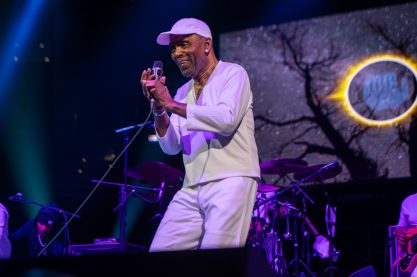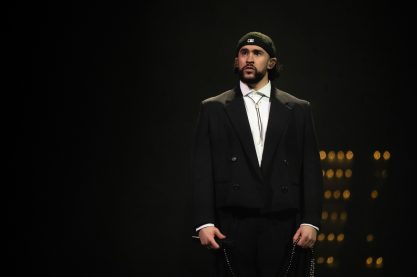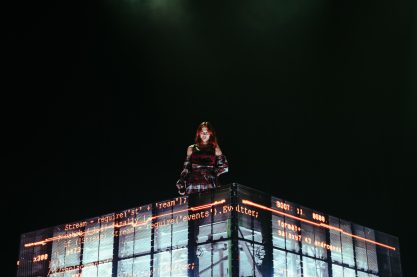Music
OPINION: On Kreayshawn, grunge and the music industry as the Tower of Babel
We're now dealing with grunge's destruction of this musical generation's Tower of Babel. Unsure of how 90s rock's melodramatic turn relates to an epic story of biblical proportions? Please keep reading...

This coming August 19th, Frances Bean Cobain, the daughter of iconic Nirvana lead singer Kurt Cobain and Hole front woman Courtney Love turns 19. The eminent child of the grunge movement has reached adulthood, bearing the fruits of being raised in the grunge tradition. In less legendary news, on September 24th, hot rapper of the moment, Natassia "Kreayshawn" Zolot, daughter of 90s San Francisco garage punk act The Trashwomen's lead guitarist Elka Zolot turns 22. The children of grunge are now grown, and in the case of Kreayshawn, able and prepared to inform pop music in a manner that like grunge, is alternative, favoring sonic deconstruction and in eschewing established norms of popularity, favoring the embrace of unique and intentionally personal celebration. There are those calling Kreayshawn just another white rapper, or a new age female voice, and they're missing the point. She's a young woman raised without traditional rules, now existing in a world confronting her with regulations that never applied, which given her creative vision, and those in her same situation, hopefully never will. Mainstream music has created a Tower of Babel, a unified norm, and with swift destructive power, the grunge raised lords of the underground have been sent to seek and destroy.
[youtube]http://www.youtube.com/watch?v=6WJFjXtHcy4[/youtube]
It's time that we understand that rap is no longer an African-American urban movement based in struggle, but has succeeded to the point of now being just another universal creative voice. When a movement reaches the mainstream, and auteurs gain the power to fully direct their creation in the pop atmosphere, those achieved aspirations create a powerful paradigm shift. Jay-Z going from wanting to drop 16 bars to leave the dope slangin' game behind to now dropping 16 bars to preserve his relevance as a label chief and cultural icon allows new creative lanes to open in hip hop. Kreayshawn and those in her circle have filled these new spaces.
It's time that we understand that rap is no longer an African-American urban movement based in struggle, but has succeeded to the point of now being just another universal creative voice.
As a rapper, Kreayshawn's "Gucci Gucci" isn't about hot bars, it's about keeping things accessible to open a door to a creative vision. She's also a videographer down with fellow left coast visionary Lil B who was most recently tasked with making Red Hot Chili Peppers videos. Therefore, much like the great grunge performers of yesterday, it's not just the musical, it's the visual, too. "Gucci Gucci" as Nirvana's "Smells Like Teen Spirit" or Soundgarden's "Black Hole Sun?" Absolutely. Popular radio programming and contemporary music sales would tell us that rap is the new rock, and if this is the case, then the era of rollin' with straight shots and poppin' bottles needed someone to come along and explain that when cool becomes commonplace, only the most basic of bitches attempting to follow trends would wear Gucci, Louis Vuitton, Fendi or Prada.
Speaking of clothes and accessories, it raises a few important points. Much of Kreayshawn's look, much like Seattle grunge kids, is based not out of a ham handed attempt at hip hop appropriation, but out of necessity. Seattle grunge kids wore flannel because, well, Seattle's suburbs are logging towns, and if you're a teenager working minimum wage jobs hitting the thrift stores there, you're ending up with a ton of flannel shirts. Presumably, in 2011's San Francisco, if you're hitting up thrift stores and pawn shops, there's a ton of bizarre bling, and gaudy, off brand gear that was cool for about six weeks in 2004, and not much longer past that. Even Kreayshawn's name is dipped in hip hop swagger, but emblematic of something else. Kreayshawn isn't a knock at the ghetto, but rather jacking and adding some ghetto style to the word creation, a note to the urban, but not inherently black. Once again, as grunge destroyed the notion of rock being just a place for white dudes with fishnet stockings and teased blonde hair, Kreayshawn and those in her generation destroy the notion that hip hop isn't just a place anymore for black ballers with low slung jeans, big guns and street dreams.
Genesis 11:9 from the King James Bible speaks of the destruction of the tower where it stood, disallowing the unification of the world's languages as follows: "Therefore is the name of it called Babel; because the Lord did there confound the language of all the earth: and from thence did the Lord scatter them abroad upon the face of all the earth." It's entirely possible to believe that this is the biblical standard that informs generational shifts. "I feel stupid and contagious, here we are now, entertain us," states a bored by the mainstream Kurt Cobain in Nirvana's 1991 smash "Smells Like Teen Spirit. Kreayshawn as an agent of a broader generational shift? In "Gucci Gucci," she's "got the swag, and it's pumping out my ovaries." It's 2011, and that's one of the leaders' ascension and clarion call. The times have officially changed. Mainstream music's days as a boring, predictable and lackluster party have been crashed by the sons and daughters of the revolutionary folks who did it before. As we've seen before, when the tower of Babel falls it is the dawn of wildly revolutionary days.





